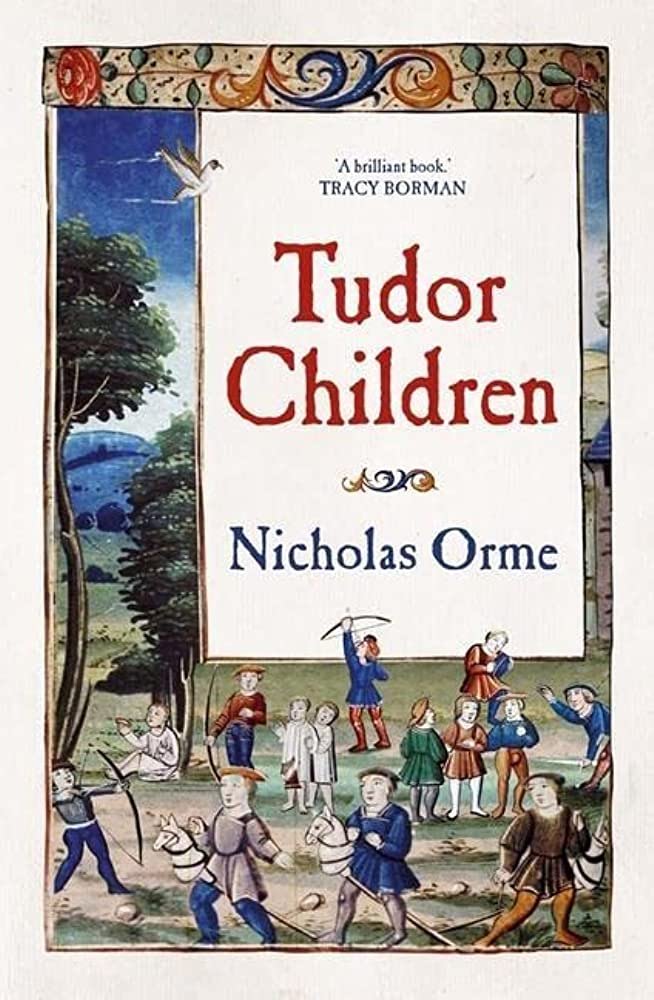Tudor Children by Nicholas Orme
/Tudor Children
By Nicholas Orme
Yale University Press 2023
Nicholas Orme’s Going to Church in Medieval England was a revelation in a way, a thoughtful and multi-layered examination of a gigantic element of medieval life that’s often too-quickly glossed over in histories of the time. Orme combed through a vast pile of records, from royal edicts to parish registers, in order to bring this element into three-dimensional reality for his readers.
In his new book, Tudor Children, Orme seeks to do the same thing for an equally omnipresent subject on a narrower time scale: children in the Tudor era.
This is at heart an impossible task, as honest parents even today will grudgingly attest: the inner world of childhood is impenetrable. Children extemporize it day by day and forget how it felt once puberty gives them more important things to think about. And if this essentially incommunicability is true today, when children are hoisted straight from sonogram to Instagram, how much more true must it be for earlier, less compulsively documentary ages? What children thought and felt is lost in its totality; what adults thought or wrote about children – to the limited extent they did the latter – is overwhelmingly concerned with their expenses, tutors, and punishments. When trying to imagine with any accuracy what 1496 work site foreman might have done or said for 20 minutes alone in a room with his 4-year-old daughter, the present-day reader must choose between ignorance and anachronism. The actual historical record offers precious little help.
This is what Orme is up against in Tudor Children, and the most obvious recourse is the one most historians have always taken: go straight to where the documents are most forthcoming – to the least representative examples in the world, the children of extreme wealth and privilege, the little sons and daughters of royalty. After all, one Tudor child was actually also a Tudor monarch – the path is naturally tempting.
Orme resists it as much as documentation will allow, and thanks to the enormous sweep of his research, that’s quite a bit. Whenever possible, he focuses on ordinary people like London grocer Richard Hill and his wife Margaret, trying to trace what those ordinary people did for pregnancy, childbirth, infant care and feeding, baptism and confirmation, schooling, instruction, and discipline. And he seems genuinely interested in all of it, as when he’s exploring one other aspect of his subject – death:
Given the numbers who died in childhood, it was inevitable that their funerals and burials (or those of their parents) would form a significant part of the life of a parish church in the sixteenth century. Up to the Reformation, there was an issue about the status of the stillborn and those who died at birth without the benefit of baptism. The understanding of human development inherited from Aristotle and other classical scientists was that an embryo acquired a soul after forty days It followed that most stillborn children had souls but, because baptism was not allowed until after birth, St. Augustine of Hippo argued that they should be condemned to hell by virtue of mankind’s original sin, and this became the orthodox view in medieval times.
These sure-footed discursions thickly populate the book. Orme always interested and interesting company on the page, and that goes a long way to compensate for the fact that he can’t ever really manage to fill what he refers to as “the gap between precept and practice.” There might be scattered hints of childhood games or sing-song rhymes, a few reliable references to the many thousands of children who were of Tudor times but not of the Tudor bloodline, but in the end, Orme is driven just like his few predecessors right back to the palaces of the nobility, where there are records enough to support the weight of historical inquiry. “It is impossible to state concisely what Tudor childhood was like, as opposed to collecting and presenting the scattered evidence about its various aspects,” Orme concedes, and we must concede right along with him. But he’s collected and presented the scattered evidence in a superbly comprehensive and readable way, the sure starting-point for all future studies of the subject.
Steve Donoghue is a founding editor of Open Letters Monthly. His book criticism has appeared in The Washington Post, The American Conservative, The Spectator, The Wall Street Journal, The National, and the Daily Star. He writes regularly for The Boston Globe, the Vineyard Gazette, and the Christian Science Monitor and is the Books editor of Georgia’s Big Canoe News.
